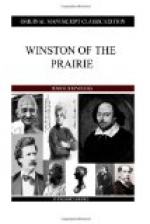“But that was a policy you condemned with your usual vigor. You really know you did.”
“My dear,” said the Colonel, with a little impatient gesture, “one can never argue with a lady. You see—circumstances alter cases considerably.”
He nodded with an air of wisdom as though that decided it, but the girl persisted. “Uncle,” she said, drawing closer to him with lithe gracefulness, “I want you to let me have my own way just for once, and if I am wrong, I will never do anything you do not approve of again. After all, it is a very little thing, and you would like to please me.”
“It is a trifle that is likely to cost you a good deal of money,” said the Colonel dryly.
“I think I could afford it, and you could not refuse me.”
“As I am only your uncle, and no longer a trustee, I could not,” said Barrington. “Still, you would not act against my wishes?”
His eyes were gentle, unusually so, for he was not as a rule very patient when any one questioned his will, but there was a reproach in them that hurt the girl. Still, because she had promised, she persisted.
“No,” she said. “That is why it would be ever so much nicer if you would just think as I did.”
Barrington looked at her steadily. “If you insist, I can at least hope for the best,” he said, with a gravity that brought a faint color to the listener’s cheek.
It was next day when Winston took his leave, and Maud Barrington stood beside him, as he put on his driving furs.
“You told me there was something you wished me to do, and, though it was difficult, it is done,” she said. “My holding will be sown with wheat this spring.”
Winston turned his head aside a moment, and apparently found it needful to fumble at the fastenings of the furs, while there was a curious expression in his eyes when he looked round again.
“Then,” he said, with a little smile, “we are quits. That cancels any little obligation which may have existed.”
He had gone in another minute, and Maud Barrington turned back into the stove-warmed room very quietly. Her lips were, however, somewhat closely set.
CHAPTER XII
SPEED THE PLOW
Winter had fled back beyond the barrens to the lonely North at last, and though here and there a little slushy snow still lay soaking the black loam in a hollow, a warm wind swept the vast levels, when one morning Colonel Barrington rode with his niece and sister across the prairie. Spring comes suddenly in that region, and the frost-bleached sod was steaming under an effulgent sun, while in places a hardy flower peeped through. It was six hundred miles to the forests on the Rockies’ eastern slope, and as far to the Athabascan pines, but it seemed to Maud Barrington that their resinous sweetness was in the glorious western wind, which awoke a musical sighing from the sea of rippling grass. It rolled away before her in billows of lustrous silver-gray, and had for sole boundary the first upward spring of the arch of cloudless blue, across which the vanguard of the feathered host pressed on, company by company, towards the Pole.




